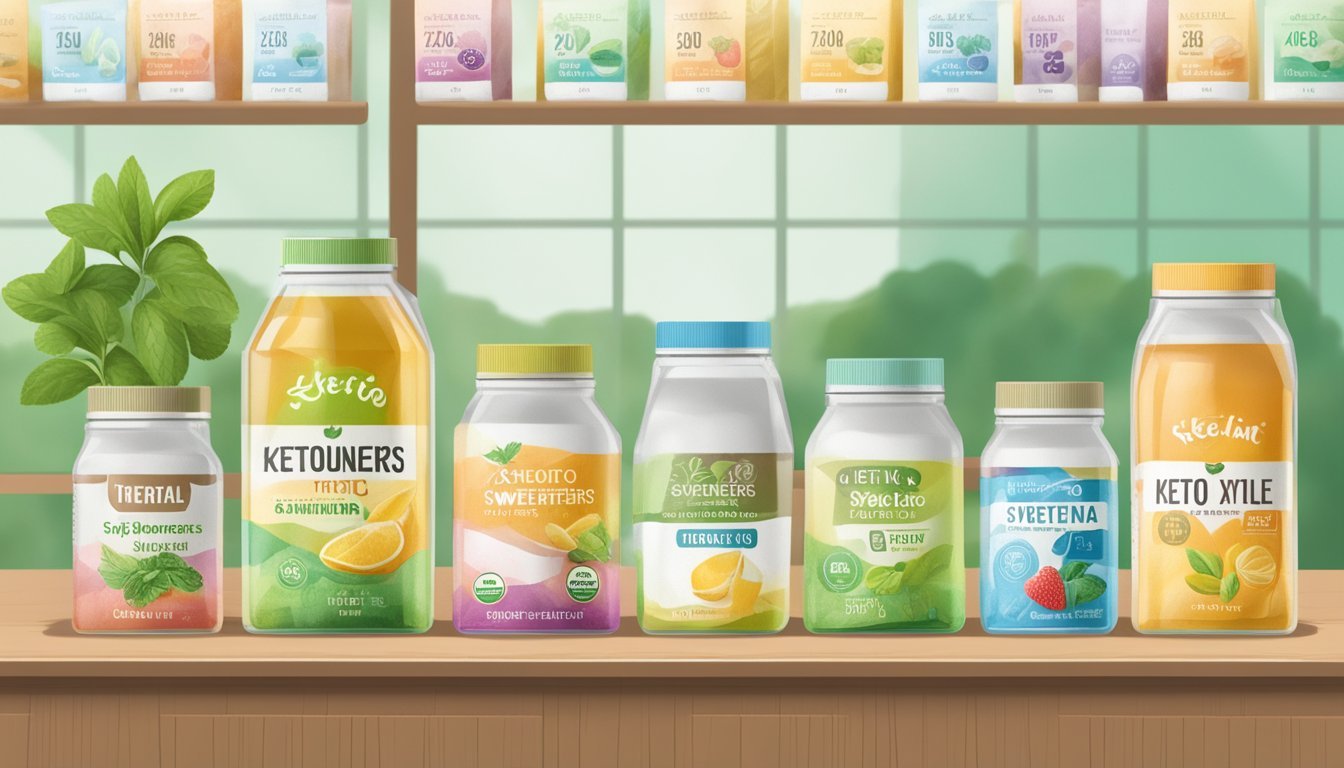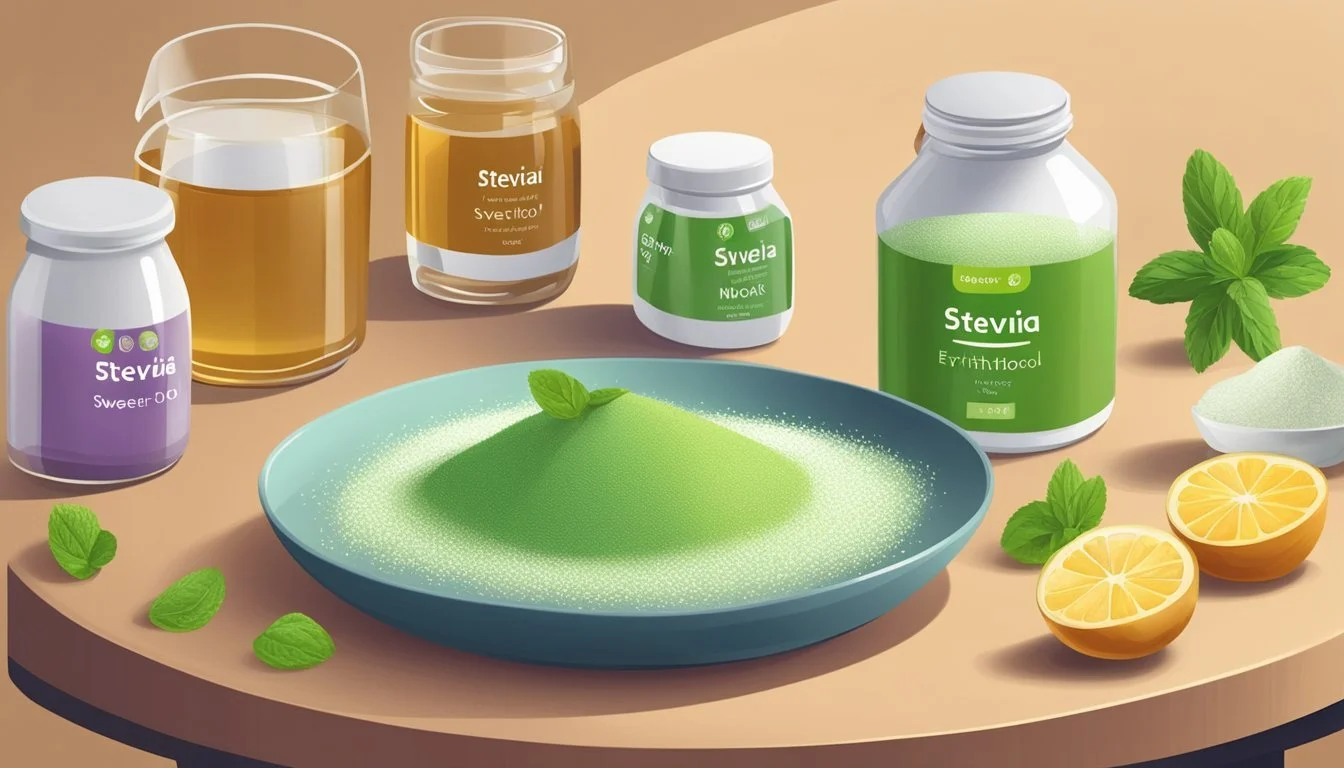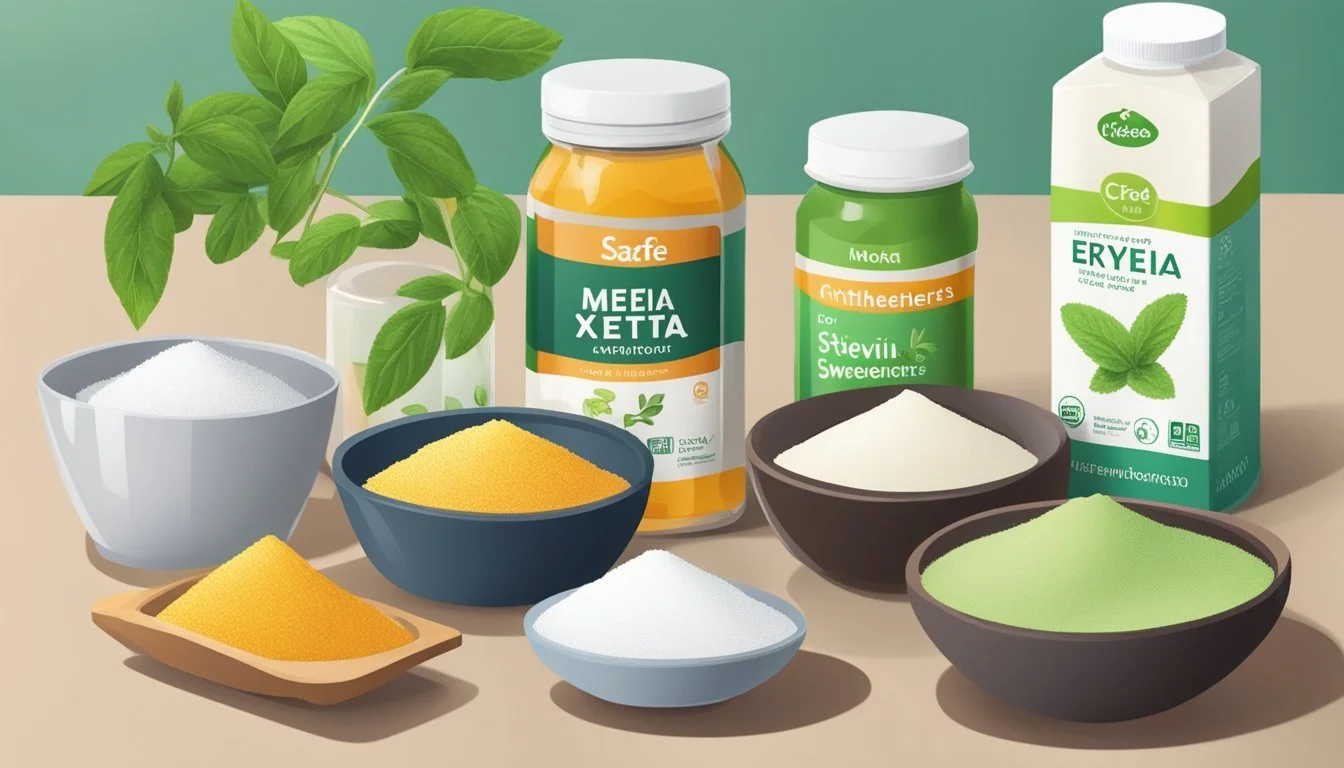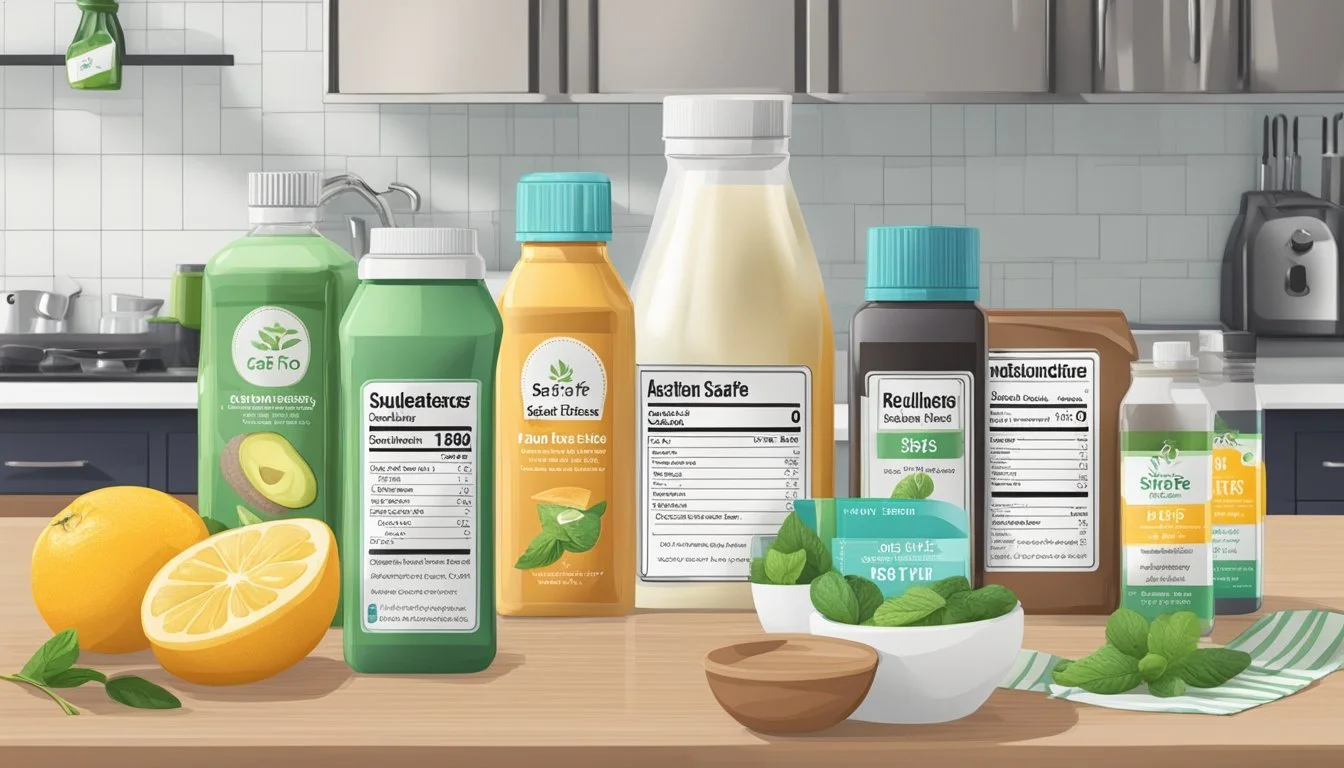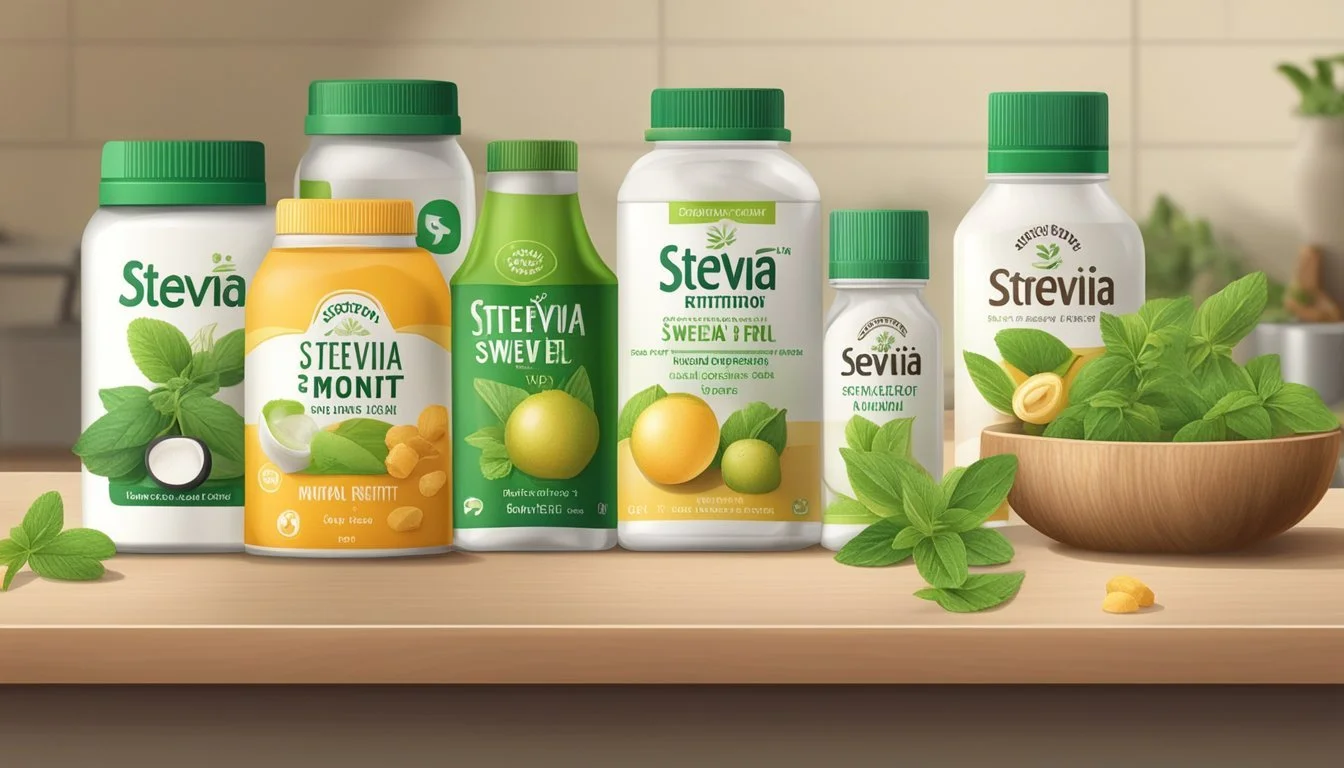Keto Diet: Safe Sweeteners and Their Impact on Ketosis
When embarking on a ketogenic diet, individuals significantly reduce their carbohydrate intake to enter a state of ketosis, where the body burns fat for fuel instead of glucose. This dietary shift poses a challenge for those with a sweet tooth, as traditional sources of sugar are high in carbohydrates and disrupt ketosis. Successfully adhering to the keto diet, therefore, often involves finding suitable sweeteners that satisfy cravings without compromising the metabolic state essential to the diet's effectiveness.
Fortunately, several sweeteners align with the keto diet's requirements, offering low-carb alternatives to sugar. Sweeteners such as stevia, erythritol, and sucralose are popular choices because they provide the sweetness people desire without the high carbohydrate content that can stall ketosis. These options are considered safe for most individuals following a ketogenic lifestyle, mainly because they have a negligible impact on blood sugar levels, which is crucial for maintaining the state of ketosis. Stevia, for instance, is derived from the leaves of the Stevia rebaudiana plant and is non-nutritive, meaning it contains zero calories and carbohydrates. Erythritol, a sugar alcohol, has a minimal caloric content and does not raise blood sugar, making it another keto-friendly option.
It's essential for those on a keto diet to not only consider the carb content of sweeteners but also their potential impact on cravings and overall health. While the aforementioned sweeteners are accommodated within the keto framework, it's imperative to use them in moderation to sustain the dietary balance. Therefore, individuals must remain informed about which sweeteners are best suited for their dietary needs to ensure the continuation of their ketogenic journey without unnecessary setbacks.
Understanding Keto Diet Fundamentals
The ketogenic diet centers on fat metabolism and carbohydrate restriction, which are critical for reaching and maintaining a state of ketosis.
Role of Carbohydrates in Ketosis
Carbohydrates are a primary energy source, but in a ketogenic diet, their intake is minimized to promote fat as the primary source of energy. For ketosis to be achieved, the body’s net carbohydrate intake (total carbs minus fiber) must be drastically reduced, typically to less than 50 grams per day. The restriction of net carbs encourages the body to switch from utilizing glucose for energy to burning fat for fuel, a metabolic state known as ketosis.
Effects of Sugar on Blood Sugar Levels
Sugars are a form of simple carbohydrates which quickly break down into glucose, leading to a rapid rise in blood sugar levels. The pancreas responds by secreting insulin, which helps cells absorb glucose. On a keto diet, frequent spikes in blood sugar from sugar intake can hinder the ability to maintain ketosis, as insulin promotes the body's use of glucose over fat for energy. Subsequently, maintaining controlled blood sugar levels is fundamental for individuals following a ketogenic diet, especially those with the goal of weight management or reduction.
Characteristics of Keto-Friendly Sweeteners
Keto-friendly sweeteners are distinct in their low to non-existent impact on blood glucose and insulin levels. They're chosen for their ability to provide sweetness without disrupting the state of ketosis.
Glycemic Index and its Importance
The Glycemic Index (GI) measures how much certain foods raise blood sugar levels. Sweeteners with a low GI are crucial in a ketogenic diet because they cause a minimal increase in blood sugar and insulin levels. Sweeteners with a GI of zero are considered ideal.
Stevia: GI of 0
Erythritol: GI of 1
Xylitol: GI of 7-13 (still relatively low but higher than others)
It is important for individuals on a ketogenic diet to select sweeteners with a low glycemic index to maintain their state of ketosis.
Natural vs Artificial Sweeteners
Natural Sweeteners typically come from plants and are less processed than artificial ones. They often contain minor amounts of carbs and can have a varying impact on blood sugar levels due to the presence of other natural components.
Stevia: A natural sweetener that does not raise blood sugar levels.
Monk fruit: Another natural option with a GI of 0, often mixed with other sweeteners.
Artificial Sweeteners are synthetic and may contain no carbs. While they don't raise blood sugar levels, their long-term effects on health are debated.
Sucralose: An artificial sweetener with a GI of 0. However, care should be taken as some products containing sucralose may have bulking agents that add carbs.
Aspartame: While it has a GI of 0, it's not always suitable for high-temperature cooking, unlike some other sweeteners.
Both types can be suitable for the ketogenic diet, but consideration of their source and impact on insulin levels is recommended. Additionally, the presence of Sugar Alcohols like erythritol and xylitol in sugar substitutes should be noted for their lower glycemic response compared to standard sugar.
Popular Keto Sweeteners
When adopting a keto diet, choosing the right sweetener is crucial for maintaining a low-carb regimen without sacrificing sweetness. Sweeteners that are commonly used within a keto diet typically have minimal effects on blood sugar levels and insulin, low to zero glycemic index, and are low in calories, making them suitable for weight loss.
Stevia and its Benefits
Stevia is a natural sweetener derived from the leaves of the Stevia rebaudiana plant. Containing compounds called steviol glycosides, it is non-caloric and can be up to 200 times sweeter than sugar. Stevia does not raise blood sugar levels, making it a favorable option for a keto diet.
Erythritol as a Sugar Alcohol
Erythritol is a sugar alcohol with a very low glycemic index. It has approximately 70% of the sweetness of sugar but contains only about 5% of the calories. Due to its negligible impact on blood sugar and insulin levels, erythritol is considered keto-friendly.
Monk Fruit: The Mogrosides Effect
Monk fruit, also known as Luo Han Guo, is a natural sweetener that contains mogrosides, which are compounds that provide sweetness without the calories. The mogrosides are antioxidants and have a glycemic index of zero, which is beneficial for those on a keto diet.
Xylitol's Impact on Blood Sugar
Xylitol is another sugar alcohol that is similar in sweetness to sugar. While xylitol has some impact on blood sugar, this is significantly less than that of regular sugar. It has a low glycemic index but a higher caloric content compared to erythritol and must be consumed in moderation.
Sucralose: Pros and Cons
Sucralose is a synthetic sweetener that is often found in sugar-free products. It is non-caloric and does not affect blood sugar or insulin levels, which makes it keto-friendly. However, some keto purists may prefer to avoid it due to its artificial nature.
Health Considerations for Sweeteners
When incorporating sweeteners into a keto diet, it is important to consider their impact on blood sugar levels, digestive health, allergies, and long-term health outcomes.
Managing Blood Sugar and Insulin Response
Sweeteners can vary in their effect on blood sugar levels and insulin response. For individuals with diabetes or insulin resistance, stevia and erythritol are favorable as they have minimal impact on blood glucose. Sucralose, although it doesn’t raise blood sugar on its own, is often bulked with dextrose which can stimulate an insulin response.
Stevia: Negligible effect on blood sugar and insulin.
Erythritol: Minor impact on blood glucose; generally well-tolerated by the body.
Sweeteners and Digestive Health
Sweeteners such as xylitol and erythritol can cause digestive issues, including bloating and gas, especially when consumed in large amounts. Natural sweeteners like yacon syrup may support gut health due to the presence of prebiotic fibers but should be used in moderation to prevent digestive discomfort.
Xylitol: Can lead to bloating and gas; has a laxative effect when overconsumed.
Yacon Syrup: May promote gut health; excessive consumption can cause digestive distress.
Potential Side Effects and Allergies
Some keto-friendly sweeteners may cause adverse reactions or allergies in sensitive individuals. Sweeteners like aspartame and saccharin have been associated with potential health risks and should be approached with caution.
Aspartame: Potential for allergic reactions; controversial due to potential risk factors.
Saccharin: Some individuals report allergic reactions; it has a mixed safety profile.
Long-Term Health Impacts
The long-term health effects of sweeteners, particularly artificial ones, remain under scrutiny. Excessive use of fructose, even from low-glycemic sweeteners, can contribute to obesity and fatty liver disease. Conversely, some sweeteners, like stevia, have demonstrated positive effects on blood pressure and inflammation, which can aid in weight loss and overall health.
High Fructose Sweeteners: May contribute to obesity and fatty liver.
Stevia: Can aid in reducing blood pressure and inflammation.
Incorporating Sweeteners into a Keto Diet
When adopting a keto diet, it is essential to choose sweeteners that have minimal impact on blood glucose levels, to maintain the characteristic low carb state of the diet. Understanding how to properly use keto-friendly sweeteners in various contexts is crucial for both taste and health.
Cooking and Baking with Keto Sweeteners
In cooking and baking, natural sweeteners like stevia and monk fruit are popular for their minimal impact on blood sugar. For instance, erythritol is an excellent heat-stable option for baking, providing a sugar-like sweetness without the carbs. It’s important to note that these sweeteners can be much sweeter than sugar, so adjustments in quantity are necessary.
Monk Fruit: Ideal for sauces and glazes due to its ability to dissolve well.
Erythritol: Works well in baked goods like cookies and cakes.
Sweetener Substitutions in Recipes
When substituting sweeteners in recipes, it's crucial to use equivalents that provide similar sweetness. Many keto sweeteners are available in granulated or powdered forms, resembling the texture of traditional sugar, which is helpful in achieving desired outcomes.
Stevia: A potent sweetener; a small amount can replace a full cup of sugar.
Sucralose: Suitable for use in a range of recipes, but it's essential to select a form that doesn't contain fillers affecting carb content.
Beverages and Sweetener Choices
Beverages are common vehicles for added sugars, and selecting the right sweetener can maintain ketosis. Sweeteners like stevia and sucralose are soluble in liquids and preferred for their neutral taste, making them good choices for coffee, tea, and keto-friendly smoothies.
For a coffee or tea: A pinch of stevia or a splash of liquid sucralose will sweeten without carbs.
In smoothies: A spoonful of monk fruit extract can add sweetness without altering the flavor profile much.
Common Pitfalls and What to Avoid
When adopting a keto diet, one must be vigilant about their sweetener choices. Missteps can lead to stalled weight loss, increased sugar cravings, and possible negative health outcomes.
Excessive Sweetener Use
Consuming too many sweeteners, even if they are keto-friendly, can perpetuate a reliance on sweet tastes, potentially sabotaging the retraining of one's palate. Overuse may also trigger cravings for sugar, causing difficulty in maintaining a ketogenic state.
Sweeteners to Steer Clear Of
Certain sweeteners have a substantial impact on blood sugar levels and are not conducive to a ketogenic diet. Individuals should avoid:
High-carb sweeteners: Such as honey, maple syrup, and agave.
Certain sugar alcohols: Maltitol and sorbitol are known for their high glycemic index and can cause digestive discomfort.
Synthetic sweeteners: Aspartame and saccharin may be non-nutritive but can still elicit an insulin response or have other unwanted side effects.
Misleading Labels and Marketing Claims
Products may claim to be "keto-friendly" while containing sweeteners that are not suitable for a ketogenic diet. It is critical to read nutrition labels meticulously and understand that terms like "no added sugar" do not necessarily mean a product is low in carbohydrates or suitable for keto.
Safety and Regulatory Concerns
When incorporating sweeteners into a ketogenic diet, it is crucial to consider their safety and regulatory status. Two important aspects of this are FDA approval and understanding food labels.
FDA Approval and Classification
The Food and Drug Administration (FDA) classifies sweeteners as either artificial or natural. Artificial sweeteners, like aspartame and sucralose, are synthetic and usually offer a high intensity of sweetness with minimal or no calories. Before these sweeteners reach the market, the FDA evaluates them for safety and potential health risks. Natural sweeteners, including stevia and monk fruit, are derived from plants and are also subject to FDA approval. However, the focus tends to be on their extraction and refinement processes to ensure safety for consumption.
Allulose, a newer sweetener marketed as keto-friendly, is recognized as safe by the FDA. It mimics the properties of sugar, making it versatile for baking and freezing without contributing significantly to carbohydrate intake.
Sugar alcohols, such as erythritol, xylitol, and mannitol, fall into a separate category known as Generally Recognized as Safe (GRAS). This designation means they are not subjected to the same premarket approval process as artificial sweeteners but are still considered safe based on extensive research and history of use.
Understanding Labels and Ingredients
Knowing how to read food labels is essential for those on a ketogenic diet. Ingredients are listed by quantity, from the highest to the lowest amount. Sweeteners can sometimes be hidden under different names, making it important to recognize all possible terms. For example, sugar alcohols may appear as sorbitol or lactitol.
Fillers are often used in conjunction with sweeteners to provide bulk or mimic the texture of sugar. Common fillers include dextrose and maltodextrin, which can impact blood sugar levels. Therefore, even products labeled as "sugar-free" or "low-carb" may not be suitable for a ketogenic diet if they contain these fillers.
It's also critical to note that not all non-nutritive sweeteners are calorie-free. Some may have a minor caloric impact, although generally much lower than that of sugar. By understanding labels and ingredients, individuals can make informed decisions about which sweeteners align with their dietary goals and health considerations.
Conclusion
When approaching sweeteners within the context of a ketogenic diet, individuals should focus on those that have minimal impact on blood sugar levels. They should prioritize low-carb, low-calorie options likely to maintain ketosis—a metabolic state key to the success of the ketogenic lifestyle.
Keto-Friendly Sweeteners:
Stevia: Naturally derived and zero-calorie.
Erythritol: Has a low glycemic index and does not spike insulin.
Monk Fruit: No calories or carbs and much sweeter than sugar, allowing for less use.
Sucralose: Non-nutritive and not metabolized by the body, though care should be taken as some products may contain fillers that add carbs.
Sweeteners to avoid due to high carb content or high glycemic index include traditional sugars like sucrose, high-fructose corn syrup, maltose, and dextrose.
In terms of weight management, selecting the right sweeteners is essential. The appropriate choices help manage cravings without compromising the body’s state of ketosis. This supports sustained weight loss and overall health benefits of the ketogenic diet.
It's crucial for individuals to read labels carefully. Some sweeteners, even if low-carb, may be mixed with bulking agents that increase carb content. Furthermore, a healthy lifestyle incorporates whole foods, and sweeteners—regardless of their type—should be used sparingly.
Adhering to these guidelines ensures that those following a ketogenic diet can enjoy sweetened foods in moderation while staying aligned with their health and weight management goals.

